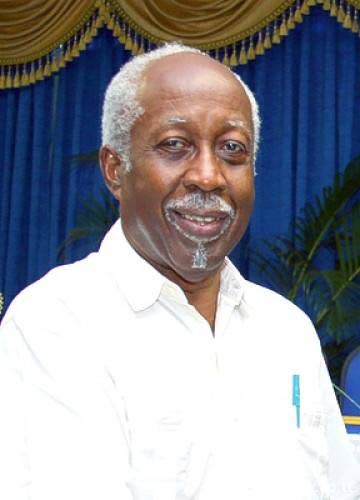Are we really serious?

REGINALD DUMAS
ON JANUARY 17 a friend in Trinidad emailed me to say I was being savaged on a radio station by persons he called “PNMites.” The topic was the Sandals pullout and among other things, I was apparently being accused of having invited Mariano Browne – a dissident PNMite, hence anathema to true party believers – to address a meeting on the subject that evening in Tobago.
Linked with Mariano, I was, it seems, being lambasted as a Sandals (and also, I assume, government and PNM) adversary, no doubt with a personal agenda. (In fact, no such meeting took place, but I shall come to that.)
I was reminded of a similar incident when the People’s Partnership was in office. I had criticised Timothy Hamel-Smith, then Senate President, and was at once assailed by the UNC strike squad, one person even purported to show how I could myself have concocted an e-mail sent by Hamel-Smith.
You must give me credit for having achieved such a remarkable balance of excoriation. Especially when in government, both sides have me in their sights; I’m an equal opportunity offender. Why? Because, in exercising my constitutional right to freedom of thought and expression, I say and do things which those in office (and, particularly, their votaries) do not like.
DISMEMBER
THE MESSENGER
Dealing with what I say or do is not as satisfying as dealing with me personally. Ignore the message; attribute to the messenger motives he never even imagined; dismember him. I’m not the only target. It’s a characteristic of our culture, and it’s not doing us any good.
On the Sandals matter, words and phrases like “naysayer” and “negativity” and “people with personal agendas” are bandied around by government talking heads. But I haven’t spoken to a single person in Tobago, not one, who is in principle opposed to the entry of Sandals as a business investment. Neither am I. Rather, what I had repeatedly been hearing, and I agreed, were two concerns.
One, the government had been uncommunicative on the project. Public consultations had been promised; for whatever reason(s), they had never materialised. What was going on? Was the government hiding something? Two, there was, and continues to be, great worry over the fragile eco-system of the Buccoo area.
What we blithely call “the world-famous Buccoo Reef” has been under serious threat for years. Would the operations of the two planned hotels further damage the reef, as well as the Nylon Pool, contiguous wetlands, and wildlife? With what consequences for Tobago? What of our obligations under the Ramsar Convention, not to mention our own Marine Areas Act?
Other questions were asked. What about revenue projections? What measures did the government have against transfer pricing? Had procurement rules been followed? Where was the money for construction coming from? What about employment at, or generated by, the resort? The overall experiences of other islands that host Sandals hotels? Did southwest Tobago, including the proposed resort location, sit on an earthquake fault line? And so on.
None of this was meant to be obstructionist. On the contrary, citizens in a democracy must try to acquire a sound idea of where they’re headed. In the context of good governance, they have a responsibility to ask questions, make comments, and brief themselves; the government has a responsibility to consult meaningfully and listen carefully.
WHO TO OFFEND NOW?
I am heartened that fewer and fewer people are “buying cat in bag” or bowing to diktats from above. However, too many of us still spend too much time accepting our side without murmur and pulling down others without compunction. Party above country, as a senior Minister publicly indicated last year? Or party-as-country? That’s progress? We serious?
I had been following Afra Raymond’s admirably determined efforts on the Sandals issue. However, it was only in late November, when I read the non-binding Memorandum of Understanding (MoU) between the government and Sandals, that I sat up in dismay. Given the continuing absence of government consultation with citizens, I invited Afra to Tobago in December to give a public lecture on two things: his ultimately successful campaign under the Freedom of Information Act to obtain the MoU, and his views on the document. This was a matter of public education and information, not party politics. The meeting went extremely well.
A second such meeting was planned for January 17, to be addressed by Mariano (on the Sandals Group business model, not on Sandals in Tobago) and by an environmentalist (on the Buccoo eco-system). Immediately following the announcement of the Sandals exit, that meeting was cancelled. However, the environment, Sandals or not, remains a front-burner subject for Tobago, and a meeting wholly devoted to it is being contemplated.
I wonder who I’ll offend this time.


Comments
"Are we really serious?"